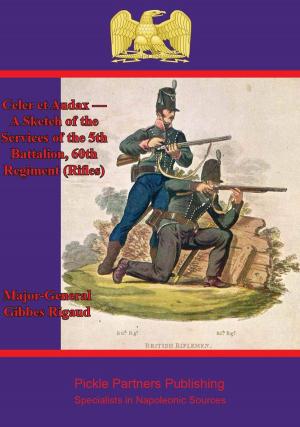Conqueror And Administrator:
Civil And Military Actions Of Marshal Louis-Gabriel Suchet In The Spanish Province Of Aragon, 1808
Nonfiction, History, Spain & Portugal, France, Military| Author: | Major Jean-Philippe Rollet | ISBN: | 9781786250001 |
| Publisher: | Wagram Press | Publication: | November 6, 2015 |
| Imprint: | Wagram Press | Language: | English |
| Author: | Major Jean-Philippe Rollet |
| ISBN: | 9781786250001 |
| Publisher: | Wagram Press |
| Publication: | November 6, 2015 |
| Imprint: | Wagram Press |
| Language: | English |
During the Peninsular War in Spain from 1808 to 1813, Marshal Suchet not only successfully fought the Spanish “Guerillas” but he also skilfully administrated the province of Aragon. He made it a relatively safe and prosperous place for his troops, while the rest of Spain became a nightmarish quagmire for the French occupiers.
In early 1808, Napoleon, under the pretext of a dispute between the Spanish King Charles IV and his son Ferdinand, invaded Spain. His troops were at first greeted as liberators by the populace, who wanted to be rid of King Charles’ Prime Minister Manuel de Godoy. As it became clearer that Napoleon’s intentions were to take control of the Spanish kingdom and to crown his own brother, Joseph, as King, the people of Spain revolted.
Appointed the governor of the insurgency-troubled province of Aragon after he had seized its main cities, Marshall Suchet skilfully adopted a balanced policy mixing strong military action and economic reforms to regenerate the local economy. He also adopted political measures aimed at restoring the appearance of a Spanish sovereignty. At the operational level, Suchet restored the discipline of III Corps and developed a network of strong places that ensured a French armed presence throughout the region while relying on highly mobile autonomous units to chase the guerrillas in their strongholds. An astute economist, he succeeded in developing the local economy, while also establishing a mutual beneficial relationship between his troops and the populace. Politically and culturally aware of the Spanish situation, he utilized the specificities of the Aragonese people to thwart the influence of the guerrilla leaders. He eventually established a flexible policy based on a mix of benevolence and coercion. During his administration, Aragon remained a relatively safe place, with a sustainable economy and, above all, one where the French soldiers and the population could mix and establish contacts.
During the Peninsular War in Spain from 1808 to 1813, Marshal Suchet not only successfully fought the Spanish “Guerillas” but he also skilfully administrated the province of Aragon. He made it a relatively safe and prosperous place for his troops, while the rest of Spain became a nightmarish quagmire for the French occupiers.
In early 1808, Napoleon, under the pretext of a dispute between the Spanish King Charles IV and his son Ferdinand, invaded Spain. His troops were at first greeted as liberators by the populace, who wanted to be rid of King Charles’ Prime Minister Manuel de Godoy. As it became clearer that Napoleon’s intentions were to take control of the Spanish kingdom and to crown his own brother, Joseph, as King, the people of Spain revolted.
Appointed the governor of the insurgency-troubled province of Aragon after he had seized its main cities, Marshall Suchet skilfully adopted a balanced policy mixing strong military action and economic reforms to regenerate the local economy. He also adopted political measures aimed at restoring the appearance of a Spanish sovereignty. At the operational level, Suchet restored the discipline of III Corps and developed a network of strong places that ensured a French armed presence throughout the region while relying on highly mobile autonomous units to chase the guerrillas in their strongholds. An astute economist, he succeeded in developing the local economy, while also establishing a mutual beneficial relationship between his troops and the populace. Politically and culturally aware of the Spanish situation, he utilized the specificities of the Aragonese people to thwart the influence of the guerrilla leaders. He eventually established a flexible policy based on a mix of benevolence and coercion. During his administration, Aragon remained a relatively safe place, with a sustainable economy and, above all, one where the French soldiers and the population could mix and establish contacts.








![Cover of the book With An Ambulance During The Franco-German War [Illustrated Edition] by Major Jean-Philippe Rollet](https://www.kuoky.com/images/2014/june/300x300/9781782891598-5bao_300x.jpg)






